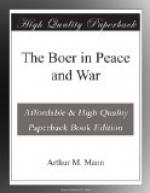There are hundreds of farmers, more particularly in the Free State, who are unable to realize the extent of their wealth in stock or the acreage of their own farms. They brand every ox, sheep, and horse that belongs to them, and it is only by such marks that they are enabled to recognise their own property when they see it. I have known instances where hundreds of horses belonging to one man have succumbed in a single season on account of horse-sickness, and their owner regarded the loss as a mere trifle, because he knew that such a catastrophe did not materially affect his position.
Klondyke had its ‘millionaires in huts,’ Boerland has its millionaires in hovels. You will find farmers who are worth many thousands of pounds living in places under whose roofs a Kaffir would certainly disdain to pass the night. They possess wives and families, too, but they exhibit no desire to better their domestic surroundings. If the houses happen to include another room other than the living room, that extra room is invariably used for storing grain. The women are untidy and unprepossessing, and the children have not yet learned to appreciate stockings and shoes. It is almost paradoxical to think of human beings in a civilized country living such lives, people who have great possibilities within their reach. The children readily assimilate the habits and ways of their parents, and grow up into men and women of a like type, and so on from generation to generation. No wonder, then, that the Boers are a retrograde race.
[Illustration: A Boer family.]
It has been made sufficiently plain that when once the Boers have acquired a country, they allow that country to rest in peace—from an agricultural point of view only. This is quite apparent when it is explained that the Free State has an estimated acreage of 7,491,500, and out of that only 75,000 acres are cultivated. This is not the fault of the country, but of the Boer himself. He has no sooner settled down on a bit of land, where there is a plentiful growth of grass to feed his stock, than he longs for pastures new, his only reason for staying where he is being that he does not want the Englishman to step into his homestead.
No exhibition of national prejudice is intended when I say that were the Dutch Republics sprinkled with a few hundred Scottish farmers, these countries would assume a more fertile and healthy aspect in two or three years. The soil is good; all that is wanted is concentrated hard work, and the countries would surprise several people—the Boers, for instance—by the extent of their agricultural wealth. There are, of course, climatic disadvantages to contend against—prolonged droughts are of common occurrence—but, as in other countries, the farmer must take the bad with the good. The great thing with the Boer is stock, and plenty of it. He does not care about anything else until the rinderpest comes.




